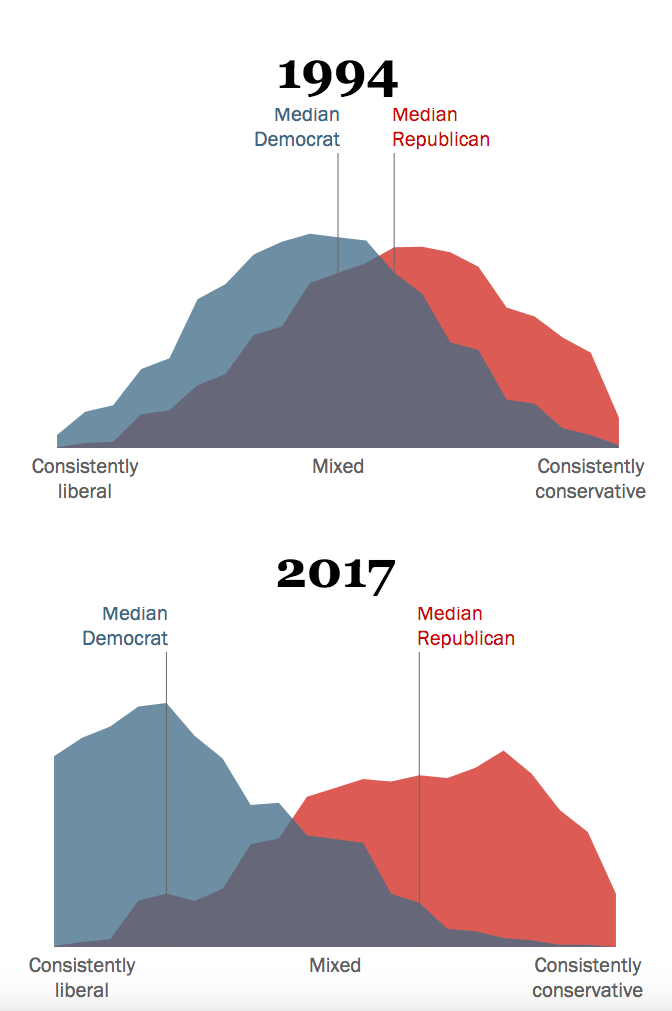Table of Contents
Unifying the Country
(Topics: Administration & Security | Back to Home)
America is divided. That's not news to any of us. I can cite statistics or news reports, but what is obviously and devastatingly true does not require further proof. We are fighting with each other today more than we have been in living memory.
In order to discuss what to be done about our culture of mutual destruction, I think we need to answer some painful, but fundamental questions:
- How did we get to be so divided?
- What does it mean to be unified?
- How can we become unified again?
- What can one member of Congress do about it?
The Origins of Our Decline
I've always been fascinated by history. The stories of people who came before us are truly instructive for who we are, and who we have the potential to become. And the story of our present national climate begins in 1945. In that year, the United States led the Allied powers as we ended the Second World War. But to put it that way does not illustrate the scale of this victory. Other countries from almost every continent were part of the winning side, but the America was the largest industrial power. And unlike other nations, our country had not been crisscrossed by armies. Our cities were not ravaged by bombing raids. We finished the conflict with the homeland almost entirely unscathed—-and we had a wartime economy roaring at breakneck speed.
The United States was an international superpower. And stateside, we underwent a rapid transformation in our economy and society. We struggled with deep moral questions in foreign and domestic affairs. We survived protests and embargoes. We changed our laws and brought more people into the national conversation. And while change never happens fast enough for the disenfranchised, our country became a better country.
And then in 1991, we lost our mortal enemy. The collapse of the Soviet Union ended the threat of complete, sudden annihilation. Over the course of the next three decades, our leaders and our communities became more and more divided. The memory of a nation united in war against the evils of fascism had declined. The constant drumbeat of nuclear winter and social collapse from communism faded into the distance. And without a single enemy to fight, our leaders chose to have us fight each other.
Data from the Pew Research Center [1] shows it clearly:

We're divided. And if the trends continue, we're only becoming more so every day.
What Makes a Nation
I'm running for Congress in Indiana, to represent about 600,000 people in a country of about 328,000,000. But even though Hoosiers in my part of the state have our own needs, we are all Americans. We all care about the country in which we live, the shared heritage of laws and traditions, the opportunities for economic, cultural, and civic engagement.
Being unified as a country, however, doesn't mean that we agree on everything. In the first few years of the conflict in Europe, many Americans were divided on whether or not we should get involved. After the attack on Pearl Harbor, some Americans thought we should not declare war on Germany. [2] But we did agree it was important to follow the law. That it was important to speak the truth. That we needed to make decisions democratically.
Being unified as a country is about having the fundamentals in common:
- We recognize everyone's right to their own ideas and views
- We acknowledge that rules and laws are necessary, even if we think differently about specifics
- We can disagree strongly without hating each other
- We admit that we could be wrong and are opening to learning, growing, and changing
I don't know how human beings can live and work together without these principles. But what makes America a great country is our tradition of dialogue and service. Patriotism is embracing the reality that we're all in this boat together.
Finding Our Way Again
To become unified as a country, I think we need a common goal. And while in the past we've used a common enemy, in this century I think our shared vision should be one of cooperation. We can be the most vibrant democracy on earth.
But that means we have to be unrelenting in our commitment to civil discourse. We have to show up not to scream at each other, but to listen. We have to ask fair questions. And we must make an effort to try and understand the views of others, rather than insisting without analysis that they are wrong and un-American.
Doing What We Can with What We Have
The problems we face as a community and a country are enormous. What can one member of the U.S. Congress do about it?
The answer depends as much on you as it does on me. I believe that people are tired of the business-as-usual from partisan candidates. They are tired of the constant focus on money. They are tired of representatives who do not represent. If you're sick of politics, I am the anti-politician.
But a single elected representative can make a difference because of the message it sends. A single elected representative who is an independent, who is seeking no campaign donations, tells a new story.
It's a reason for the establishment to listen. Because if we can get unified around an independent, non-partisan candidate, that's a reason for the partisans to be concerned.
It means democracy is working.
[1] https://www.pewresearch.org/politics/interactives/political-polarization-1994-2017/
[2] https://exhibitions.ushmm.org/americans-and-the-holocaust/us-public-opinion-world-war-II-1939-1941